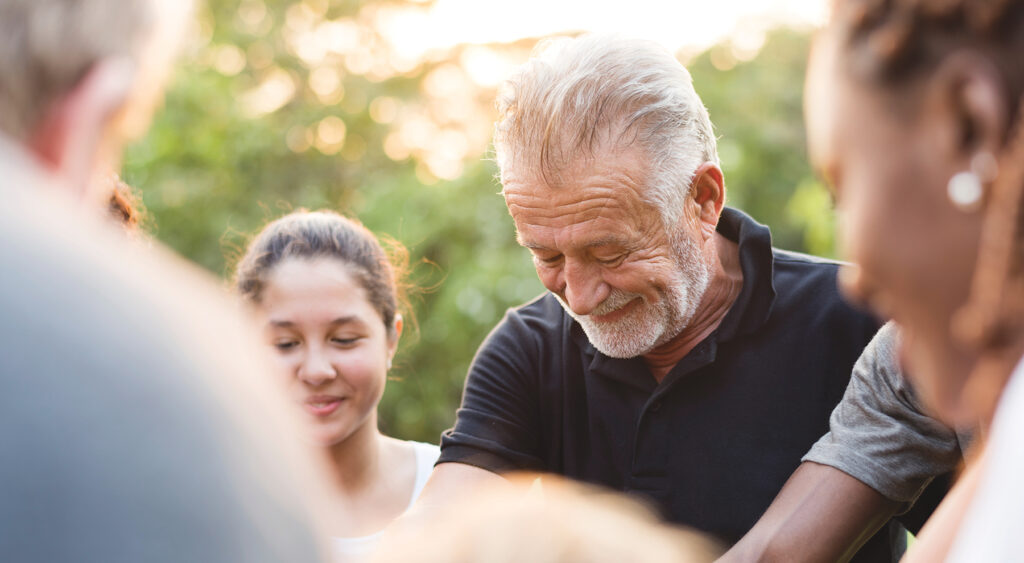Growing into Spiritual Maturity
It is the experience of Friends in the twenty-first century that the health of a Friends meeting depends on a clear sense of identity, a collective vision of a peaceable world that inspires action and hope, and leadership that is clearly identified and responsive to the leadings and concerns of its members. The meeting must also attend to the ongoing maintenance of its own spiritual well-being. It has been my experience that many meetings struggle with defining their leadership structures. Instead of being responsive to the spiritual formation of their members, they become reactive and confused about the authority of the meeting when disturbances in its life arise, not only in conflicts but when members fail to participate, and membership declines.
A little over a hundred years ago, yearly meetings in Friends General Conference (FGC) advised their meetings to lay down the recording of ministers and elders: those Friends charged by the meeting to faithfully attend to spiritual formation and promotion of unity (conflict resolution) among meeting members. In response, most meetings redistributed these integral functions to committees of worship and ministry and of oversight and pastoral care.
This change allowed for the reunification in the 1950s of yearly meetings that had variously fractured in the early nineteenth century along Liberal, Progressive, Orthodox, and Conservative lines. By the end of the twentieth century, however, it had led many Liberal Friends to become confused about how the structures of the meeting contribute to the discernment of God’s will for the community. Additionally, Friends were unclear about the meeting’s authority in the spiritual formation of its members and the discernment of its own unity.
Eldership among Friends has always existed wherever Friends have gathered with the intention of being faithful to the tradition, the vision, and practice that became normative by the end of the seventeenth century. It is an essential practice of our faith and an integral support to the life and flourishing of a meeting. At most meetings, the members of the worship and ministry committee take responsibility for the spiritual formation of members through ensuring the depth of worship and the teaching ministry. The pastoral care committee ensures the expression of love and affection among members and works to restore unity to the body when conflicts arise. Unfortunately, many members of these committees are unaware of their leadership tasks when they first join. They may only learn of these structural functions in the meeting when problems arise.

For early Friends, the most egregious sin a person could fall into was self-delusion: making a profession of faith and then behaving in ways counter to that profession. They intuited that following a spiritual path often brings the shadow side of our personality—the unconscious and self-interested—to the fore. This belief is the root of our suspicion of paid ministry. And it is especially the case when we encounter the anxiety of being in relationship with persons whose views or other qualities differ from our own.
The guidance provided by Quaker elders was that of a sounding board, a listening ear that could gently raise a reflective voice to help others see where they may be missing the mark and to behold dimensions of themselves that might otherwise be outside their self-awareness. This practice was radically egalitarian and countered the aristocratic and hierarchical domination system of the time. The truth of a leading or a call to ministry was to be found in dialogue with other persons, as well as with Spirit, and ultimately affirmed by the authority of the group receiving the ministry and supporting its dissemination.
Having begun my journey among Friends in the 1970s, I was aware of the presence of elders at my meeting by their leadership roles in the committees concerned with right order in worship and membership. I was not consciously aware of their role in the spiritual formation of members and often wondered if there was more to Quaker spirituality than that found in communal worship and committee service. At a FGC Gathering in the summer of 1991, I participated in a midweek interest group titled “Is Quakerism a Mature Spirituality?”
That evening, we talked about what we felt to be a lack of spiritual guidance and direction in our meetings and how many of us were turning to other spiritual traditions for a language for the inner landscape. It seemed to those in the group that the emergence of the “hyphenated-Quaker” (Catholic-Quaker, Jewish-Quaker, Buddhist-Quaker), which we had witnessed in the 1980s, was a consequence of Liberal Quakerism’s decline as a spiritual path. While many young people joined Quakers with great enthusiasm, it seemed that after a year or two of membership, they often drifted away to find a more mature path.
Eldership among Friends has always existed wherever Friends have gathered with the intention of being faithful to the tradition, the vision, and practice that became normative by the end of the seventeenth century. It is an essential practice of our faith and an integral support to the life and flourishing of a meeting.
That fall, I attended a weeklong meditation retreat on mindfulness at the Insight Meditation Society center in Barre, Massachusetts. At Quaker worship a few weeks later, I shared ministry about how Buddhist mindfulness techniques could benefit Friends. No sooner had I sat down, than an elder of the meeting stood and soundly rebuked my message. Quakers did not need to import practices from Buddhism, he said; ours was a complete and comprehensive religion with a depth of historic witness and a profound spirituality.
I was fairly stunned at the fierce reaction my message evoked—and more than a little embarrassed. The Friend who spoke so strongly to my ministry did not elaborate on his claims about Quakerism. But I heard him clearly: he was not interested in any syncretistic approach to his religion. When worship broke, I lingered in the meetingroom and was approached by another meeting elder. After some pleasantries, she invited me to read and study with her The Practice of the Presence of God by Brother Lawrence, a seventeenth-century Christian monk.
Being tenderly called into relationship by an elder interested in my spiritual formation and its unfolding as a Friend was a sudden and transformative event. It opened my eyes to the work of all the other elders in my life, past and present, who lovingly helped me on my way as a Friend, discerning my gifts, encouraging my ministry, and supporting its witness. I learned by watching that humility and compassion are the bedrock upon which the work of spiritual guidance and leadership is built and out of which our love for one another grows.

Becoming closer to the ways of the Inner Teacher is the gift that spiritually mature elders offer: a relationship that opens one to an intimacy with the Holy Spirit wherein everyone and everything we encounter becomes our valued teacher. In this way, the meeting enacts through relationships the Spirit of Love, with its power to heal our often-broken spirits and bind us to heaven here on earth (Matthew 16:19). It is a transformative journey, facilitated by the light in our conscience, which helps us to see through our defenses and gain a clearer sense of the reality of our spiritual unity and our embeddedness with all of life.
I would describe spiritual maturity in community as the ability to cope with the ups and downs of our lives together, to respond with equanimity and even at times with serenity to difficulties, setbacks, and mysteries that define our personhood. It involves staying power, tenacity, and the faithful conviction that if we are to become enlightened by Spirit, it will not be as individuals but as members of beloved community. In spiritual communion with others, we find our greatest peace and lasting joy. For Friends, this is our witness to the testimony of beloved community.
Lloyd Lee Wilson advises Friends to apprentice themselves to meeting as a way of deepening their spiritual life and developing ministry in the Quaker way. For me, this has special resonance because I began working as a printer’s apprentice after graduating from high school in 1973. For five years, I submitted to the discipline of being trained by the older journeymen in the industrial shop where I worked. Many of them served as patient and wise mentoring elders. As an apprentice, it was my job to listen, to watch, and to ask questions. It required obedience to follow the ways of the best practices of those who had gone before me. It also created a solidarity with others in the work that made the yoke of the learning experience light and ultimately rewarding. But being an apprentice has its challenges.
Submitting to the transmission of the culture requires submission to the greater knowing of the group: those who had come before as well as those present. As Friends, our unity grows from our trust in one another and our readiness to question and speak out, confident that together we can find the truth: a truth that is not static or fixed but centered in the Life, the Living Spirit that speaks to us now in this moment, and witnesses to the spiritual reality of the unity of our lives as human beings. In this regard, all members of a meeting are called to embark on the journey of eldership. For sure, it is strenuous work. In addition to humility, it requires openness; vulnerability; and an assent to a covenant of spiritual commitment, which requires us to hang in through all of the difficulties and agonies every friendship must endure. Our hope is that with the help of the Spirit, we can survive and even thrive, just as we have met difficulties in the past.
This yoke is made lighter not only when our elders and their leadership are empowered by Spirit, but when their leadership is lovingly embraced with trust and faith in that of God, which guides them in their ministry among us.
For the past 18 years, I have been involved in helping Friends address disruption and conflict in the life of their meetings: first as a member of Philadelphia Yearly Meeting’s Friends Counseling Service, and then as the yearly meeting’s care and aging coordinator. It has been my experience that meetings will struggle for years before directly addressing conflicts. On average, it takes three or four years before a meeting will reach out to a larger body like the quarterly or yearly meeting for assistance. In the eastern part of the United States, this is partly a legacy of nineteenth-century yearly-meeting schisms, but it is also due to the congregational intimacy of most modern-era meeting communities. Surely, we can do this ourselves, the thinking goes, and many meetings can and eventually do resolve their own conflicts. But it takes the leadership of eldership to make that happen, and that takes a nimble and firm ministry.
The leadership of eldership takes courage. It takes a willingness to have our strengths and weaknesses become known to others. Elders are not perfect people with all the answers. They are leaders endeavoring to be faithful people who are committed to serving the spirit of the community with love. They hold a commitment to transparency about how the meeting works as a spiritual community and how the truth of Quakerism is transmitted. Knowing how elders function to help regulate and guide the right ordering of the community lessens anxiety among members and increases understanding of how the meeting actually works. This is attractive and reassuring to newcomers.
If we are to reach out and invite newcomers to join us, we should meet their expectations from the start for an ordered and understandable spiritual practice. One of the conclusions of the Quaker Quest initiative undertaken by FGC several years ago was that it is not enough to merely stimulate interest in Quakerism. When newcomers show up to a particular meeting, they need to observe a Friends community that is vibrant: clearly understandable as well as functioning, a place where their spiritual formation will be nurtured and their participation and belonging welcomed.
A few years ago, I had the opportunity to take a three-month sabbatical from my work with Philadelphia Yearly Meeting. Reflecting on the process of Quaker spiritual formation and the maintenance of unity among Friends, I concluded that it does not happen without active love. As Friends, our practice of communal spiritual growth requires that we not merely profess the Christian virtues, the fruits of the Spirit: love, joy, peace, forbearance, kindness, goodness, faithfulness, gentleness, and self-control (Gal. 5:22–23 ESV). Our tradition calls upon us to enact these gifts in our relations with one another and with the world. This is not an easy task, yet it is essentially our discipline as Friends. My experience is that this yoke is made lighter not only when our elders and their leadership are empowered by Spirit, but when their leadership is lovingly embraced with trust and faith in that of God, which guides them in their ministry among us.





Hi
This is a great peace, so informative to my own life of Quakerism in the view of eldership. Thanks alot.
Thank you, George. I’m glad you found it helpful.